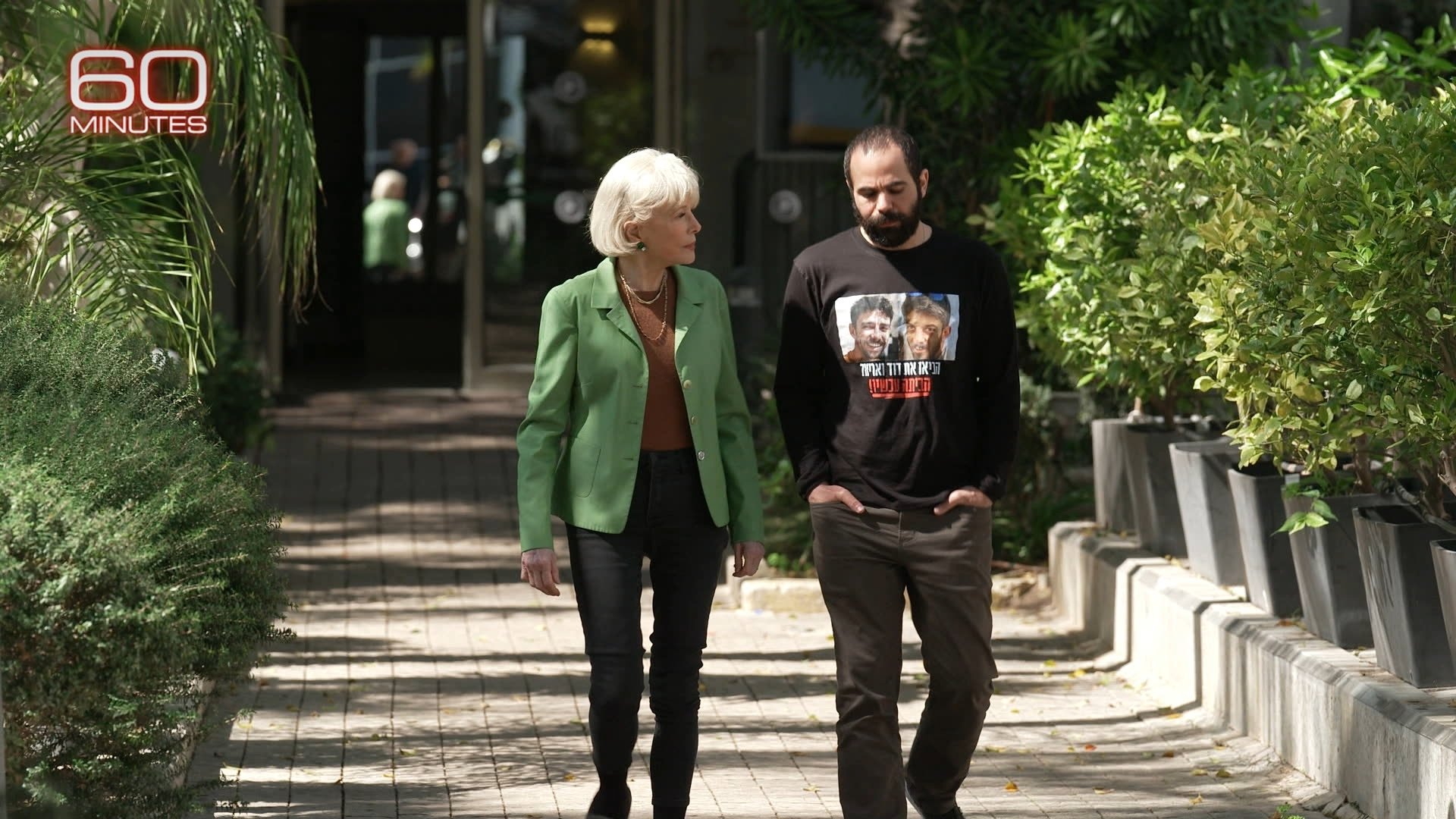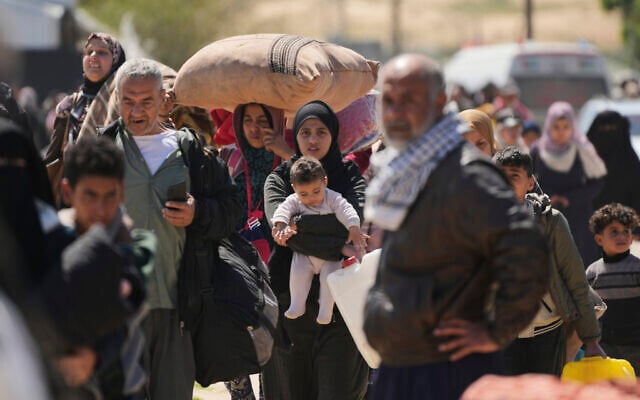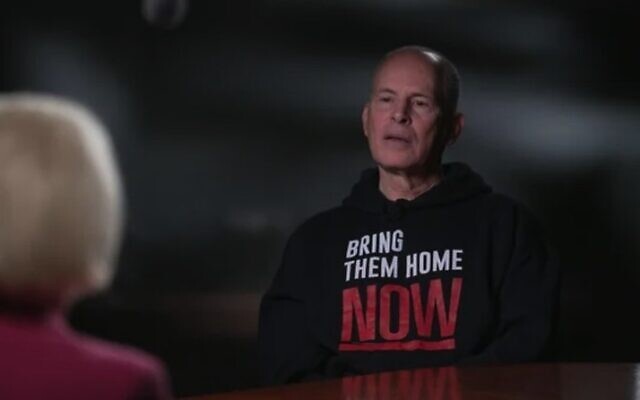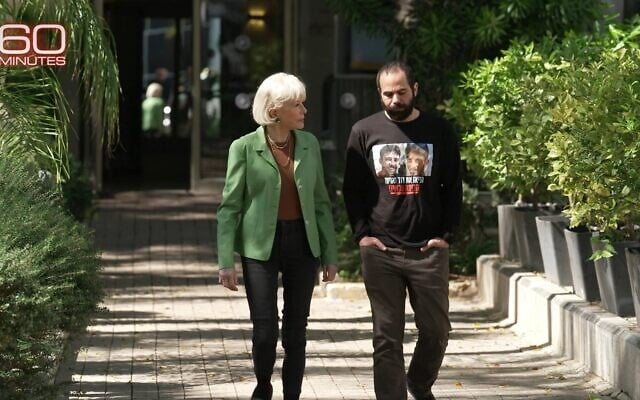



The Times of Israel is liveblogging Monday’s events as they happen.
Keith Siegel says he was forced to watch sexual assault of female hostages while in captivity
Recently released hostage Keith Siegel says he was forced to watch fellow female captives be sexually assaulted by their Hamas captors while he was held in Gaza.
“I witnessed a young woman who was being tortured by the terrorist. I mean literal torture — not just in a figurative sense,” Siegel tells CBS’s “60 Minutes.”
Siegel, who was released from captivity in February after 484 days, says he was forced to watch the abuse. “I saw sexual assault with female hostages.”
Recalling the day he was kidnapped by Hamas, the 65-year-old dual American-Israeli national says he and his wife Aviva were “driven into Gaza and then taken into a tunnel — feeling in danger, feeling life threatened, terrorists around us with weapons.”
They lived underground in Hamas-dug tunnels where “we were gasping for our breath.”
He says his treatment got significantly worse after the end of the first brief ceasefire and hostage deal in November 2023, during which his wife was released.
“The terrorists became very mean and very cruel and violent. Much more so. They were beating me and starving me,” Siegel says. “They would often eat in front of me and not offer any food.
Once a month, the hostages were allowed to shower with a bucket of cold water and a small cup.
His captors shaved his head and private parts. “Maybe it amused them… I felt humiliated,” Siegel says.
His captors managed to completely break his spirit.
“I felt that I was completely dependent on the terrorists, that my life relied on them — whether they were going to give me food, bring me water, protect me from the mobs that would lynch me,” Siegel says.
“I was left alone several times, and I was very, very scared that maybe they won’t come back and I’ll be left there. And what do I do then?” he recounts. “Maybe that was a way for them to torture me in a psychological way, make me think, ‘Should I escape? Should I not escape? Should I try to escape?'”
“But I’m pretty sure they knew I wouldn’t dare to do that because I needed them,” Siegel says.
He says that even after his release, he spends most of his day worrying about those hostages still in Gaza — 24 of whom are believed to still be alive.
The camera stays on Siegel as he breaks down, crying bitterly, folding his head into his hands and then onto the table in front of him.
Gaza’s bakeries could shut down within a week under blockade of food and supplies — UN

Gaza’s bakeries will run out of flour for bread within a week, the UN says. Agencies have cut food distributions to families in half. Markets are empty of most vegetables. Many aid workers cannot move around because of Israeli strikes targeting terror sites.
For four weeks, Israel has shut off all sources of food, fuel, medicine and other supplies for the Gaza Strip’s population of more than 2 million Palestinians, citing Hamas’s refusal to extend the first phase of the ceasefire deal and release more hostages. Israeli officials insist they allowed enough aid in during the two-month ceasefire to last Gaza for several months, while accusing Hamas of hoarding supplies for itself.
It’s the longest blockade yet of Israel’s 17-month-old campaign against Hamas, with no sign of it ending. Many are reportedly going hungry during the normally festive Eid al-Fitr, a major Muslim holiday.
Aid workers are stretching out the supplies they have but warn of a catastrophic surge in severe hunger and malnutrition. Eventually, food will run out completely if the flow of aid is not restored, because the war has destroyed almost all local food production in Gaza.
The World Food Program said Thursday that its flour for bakeries is only enough to keep producing bread for 800,000 people a day until Tuesday and that its overall food supplies will last a maximum of two weeks. As a “last resort” once all other food is exhausted, it has emergency stocks of fortified nutritional biscuits for 415,000 people.
Fuel and medicine will last weeks longer before hitting zero. Hospitals are rationing antibiotics and painkillers. Aid groups are shifting limited fuel supplies between multiple needs, all indispensable — trucks to move aid, bakeries to make bread, wells and desalination plants to produce water, hospitals to keep machines running.
Yarden Bibas: Only Trump can convince Netanyahu, Hamas to renew ceasefire-hostage deal
Yarden Bibas says only Donald Trump is capable of bringing back the hostages and ending the war in Gaza, adding that he believes that the US president can convince both Prime Minister Benjamin Netanyahu and Hamas to reach a deal.
“I think he’s the only one who can stop this war again,” Bibas tells CBS’s 60 Minutes, in his first interview since being released from captivity earlier this year, and after the bodies of his murdered wife and young children were returned several weeks later.
“He has to convince Netanyahu, he has to convince Hamas. I think he can do it,” Bibas says, indicating that both the Israeli premier and the terror group need to be pressured.
Netanyahu broke with most of the hostages’ families by ordering a resumption of the war on March 18, amid an impasse in negotiations with Hamas.
After the first phase of the deal — which brought about the Bibas’s return — concluded on March 1, Hamas sought to transition to the second phase of the deal, which envisioned the release of the remaining living hostages in exchange for the full withdrawal of Israeli forces and a permanent end to the war.
Netanyahu argued that those latter two conditions would have allowed Hamas to remain in power. He largely refused to hold talks regarding phase two of the deal for a month, before seeking to rework the terms of the deal so that the first phase’s temporary ceasefire could be extended and more hostages could be freed. Hamas refused, leading Netanyahu to resume intensive military operations throughout Gaza, arguing that additional military pressure will lead the terror group to ease its demands.
Asked whether he thinks the strategy will work, Bibas responds emphatically: “No. No.”
Describing the captivity conditions while the war is ongoing, Bibas says, “It’s scary. You don’t know when [Israeli strikes will occur]. And when it happens, you’re afraid for your life.”
“The whole earth would move — like an earthquake, but [I was] underground, so everything could collapse any moment,” he says.
Speaking of the murder of his wife Shiri, four-year-old son Ariel and nine-month-old Kfir, Yarden says, “They were murdered in cold blood — bare hands.”
He says his Hamas captors used to tell him, “‘Oh, it doesn’t matter. You get a new wife, new kids. Better wife, better kids.’ They said that many times.”
Bibas uses the opportunity to highlight the plight of his childhood friends David and Ariel Cunio, who are among the 59 hostages still in Gaza captivity after being kidnapped during Hamas’s October 7 onslaught.
“They’re both still in captivity, and I don’t know if they have enough food, enough water, especially now when the war is back on,” Bibas says.
“We did everything together,” he says of himself and David Cunio. “He was with me in every big thing in my life. He was in my wedding.”
“Now I’m having probably the hardest thing… [in] my life, and David is not with me,” Bibas laments.
“I lost my wife and kids. Sharon [Cunio] must not lose her husband,” Bibas asserts.
Report: Trump to fly to Saudi Arabia in May in first trip abroad this term; no word on Israel visit

US President Donald Trump will visit Saudi Arabia in May on the first foreign visit of his second term, Axios reports, citing two US officials with knowledge on the matter.
At the same time, the report notes that plans for Israeli-Saudi normalization are currently “on the back burner” due to Riyadh’s insistence that such a plan must include Palestinian statehood, a non-starter for Israel.
The report cites Israeli officials saying the White House has not to date discussed including a stop in Israel on the May trip.
Trump is expected to advance economic cooperation between the countries, including hundreds of billions of dollars of Saudi investment in American companies.


